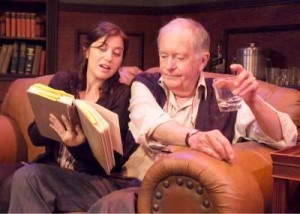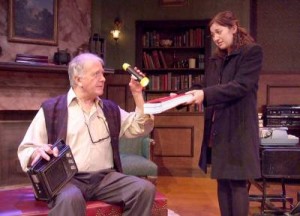RECOMMENDED
A legendary one-hit-wonder novelist receives an unwelcome late night visit from his “biggest fan” in Colin Mitchell’s Breaking And Entering, a very dark comedy now in its world premiere production at Beverly Hills’ Theatre 40 under the able direction of Mark L. Taylor.
The novelist is septuagenarian W.J. Trumbull (Steven Shaw), whose first-and-only novel is still being read and talked about some fifty years later. One celebrity who loves to quote Trumbull is Howard Cosell-like sports commentator Bob (Lary Ohlson), who just happens to be describing game seven of the World Series when the lights suddenly go out in Trumbull’s upstate New York home one dark October night. The blackout sets Trumbull’s guard dogs to barking, and when the novelist goes outside to quiet them down, who should take advantage of the one moment Trumbull’s security system is malfunctioning but pretty, twentysomething Mildred “Milly” Smith (Meredith Bishop)—a young woman who’s been pretty much stalking her idol for years.
At first Milly seems to be nothing more than just another star-struck fan. “I can’t believe it’s you!,” she exclaims excitedly, stumbling over her words in the presence of her hero. Thanks to the power outage, “I panicked with initiative,” she declares rather proudly. Though not ordinarily a creature of impulse, Millie just couldn’t let slip by the chance to ask Trumbull to read her novel, especially since book executive Randolph Murray has agreed to publish it, on condition that Trumbull write the introduction. “I told him you were my grandfather,” she explains eagerly. As for her 714-page novel (ironically titled Breaking And Entering), “It’s a good book,” she assures Trumbull. In fact, she adds, “It’s a masterpiece!”
Milly is not just any fan, she tells Trumbull. She first read his book in her attic “hiding place” when she was only twelve, and it “changed my life. It was a force of nature. It saved me.” The earnest young fledgling novelist then hands him her one-and-only hand-typed manuscript (she writes on a Smith Corona, just like he does, or did). When he shows little interest in even perusing it, she wonders aloud if he just might be afraid that it will be too good and remind him of the person he used to be. Intrigued (or perhaps simply worn down by Milly’s enthusiasm), Trumbull agrees to let her try to convince him.
A kind of cat-and-mouse game then begins between the veteran and would-be novelists. Milly is desperate to know who the mother is in Trumbull’s book, and this is not the only question she wants an answer to. Trumbull doesn’t want to talk about any of this. She persists. He’s finally tells her he’s had enough. Is this young woman his greatest fan, or an extremely disturbed young lady? Disturbed or not, Milly does not lack for sharpness, and in quizzing the master writer about point-of-view switches in his novel, the young woman makes a sudden, startling discovery which will forever alter the way she views her longtime idol.
Breaking And Entering has much to recommend in it. Mitchell keeps us constantly guessing about what’s going to happen next. The deeper we get into the plot, the more Trumbull and Milly turn into characters far more complex than we may originally have judged them to be. The darker and more twisted Breaking And Entering becomes, the harder it is to pigeonhole it as either comedy or drama. Its lead performers are never anything less than excellent, as might be expected from an actor with Smith’s five decades in live theater and an actress with Bishop’s recent string of exciting performances on L.A. stages. As directed here by Taylor, neither one could be better. Shaw makes for a great grouch of a recluse, and no one plays slightly off-kilter like the gifted young Bishop.
If I liked rather than loved Breaking And Entering, it’s probably because in my own life I prefer to stay away from manipulative, deceitful, amoral people, and these are three of the aptest adjectives to describe both Trumbull and Milly. Mitchell’s play would be even more compelling if at least one of the two writers were someone to identify with or root for.
In its favor, Breaking And Entering is a show you’ll likely be discussing with fellow playgoers after curtain calls, asking questions like these: Has Milly wasted her time idolizing Trumbull? Would any of us have made the same decision Trumbull did fifty years ago? On what basis should we make life choices, by what is right or wrong, or simply by what we can or cannot get away with? And would we love Hamlet or Romeo And Juliet as much as we do if we were to find out that someone other than William Shakespeare had penned them?
Though Breaking And Entering is essentially a two-character play, Ohlson and Christopher Gehrman provide entertaining comic relief as a pair of TV sports commentators who pop up at various odd moments (just above Trumbull’s mantelpiece) to remark on what must be the longest extra-inning baseball game on record.
Once again Jeff G. Rack has come up with a fabulously detailed set design (properties by Jan Fischer), precisely the kind of messy old mansion Trumbull would have spent the past fifty years holed up in. Jeremy Pivnick’s lighting nicely suggests a candlelit living room/study without plunging the actors and audience into semi-darkness. Costumes by Cristina Acosta and sound design by Bill Froggatt are both first rate.
Breaking And Entering is a bit edgier fare than is the norm for Theatre 40, and the language is definitely R-rated. All in all, it’s a thought-provoking play, and a production worth seeing if only for the chance to watch two actors on opposite sides of the generation gap give the kind of terrific performances that Bishop and Shaw deliver here.
Theatre 40, 241 S. Moreno Dr., Beverly Hills.
www.Theatre40.org
-Steven Stanley
August 19, 2009
Photos: Ed Krieger




 Since 2007, Steven Stanley's StageSceneLA.com has spotlighted the best in Southern California theater via reviews, interviews, and its annual StageSceneLA Scenies.
Since 2007, Steven Stanley's StageSceneLA.com has spotlighted the best in Southern California theater via reviews, interviews, and its annual StageSceneLA Scenies.







 COPYRIGHT 2024 STEVEN STANLEY :: DESIGN BY
COPYRIGHT 2024 STEVEN STANLEY :: DESIGN BY